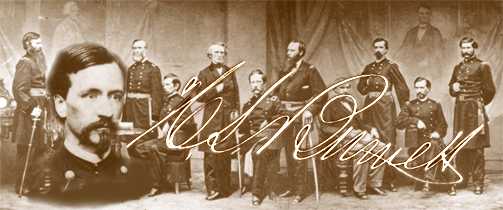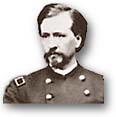GARRETT'S BARN
Arriving at Garrett's the cavalry was so disposed as to prevent anyone from escaping, and after having
extorted by threats the information that Booth and Herold were concealed in the barn, it was at once
surrounded. They were ordered to come out and surrender themselves, which Booth refused to do. After a
considerable parley, Herold came to the door and gave himself up. He was followed by the maledictions of Booth.
Booth still refused to surrender.
A wisp of hay was fired and thrown upon the hay in the barn. From this start the barn was soon lighted
up with the flames of the burning hay. Both was known to be armed and desperate, and as the burning
hay began to illuminate the barn he was seen, carbine in hand, peering through the cracks and trying to get an aim.
He had before offered to fight the crowd for a chance of his life if the Colonel would but withdraw his
men one hundred yards. Being answered that they had come to capture him, not to fight him, he was preparing to
sell his life as dearly as possible.
At this moment, Sergeant Boston Corbett, of the Sixteenth New York Cavalry, fired at Booth through the
crack in the barn, upon his own responsibility, the bullet struck Booth on the back of his head, very nearly
 in the same part where his own ball had struck the President, only a little lower down, and passing obliquely
through the base of the brain and upper part of the spinal core; it produced instantly almost complete
paralysis of every muscle in his body below the wound, the nerves of organic life only sufficing to keep up
a very difficult and imperfect respiration, and a feeble action of the heart for a few hours.
in the same part where his own ball had struck the President, only a little lower down, and passing obliquely
through the base of the brain and upper part of the spinal core; it produced instantly almost complete
paralysis of every muscle in his body below the wound, the nerves of organic life only sufficing to keep up
a very difficult and imperfect respiration, and a feeble action of the heart for a few hours.
After Booth was shot he was carried from the burning barn and laid under the shade of a tree on the lawn of
the Garrett premises. He was perfectly clear in his mind but could not swallow, and was scarcely
able to articulate so as to be understood, although he seemed anxious to talk. He requested the officer
who was bending over him trying to administer to him, to tell his mother that he died for his country.

NY Times Account of Booth's Death
Booth expired in great agony on the 26th of April, twelve days after the commission of his crime.
The body was brought back to Washington and identified fully. It was buried for a time secretly under
the floor of the old capitol prison, but afterwards was given to his friends and taken to Baltimore
and there buried in an unknown and unmarked grave.
At the moment the President was shot he was leaning with his hand or arm resting on the railing of the box, looking at some person in the orchestra holding the flag aside to look between it and the post; he
raised his head in an instant and then it fell backward. He was carried to the residence of Mr Peterson
just opposite the theatre, where he expired about seven o'clock on the morning of the 15th.
 CONTINUE
CONTINUE

-
 Colonel Burnett,
Colonel Burnett,  Mood of the Time,
Mood of the Time,  Deathbed
Deathbed 
 What Was Known
What Was Known
 Investigation,
Investigation,  Assassination,
Assassination,  Seward's Attack,
Seward's Attack,  Other Attempts
Other Attempts 
-
 First Steps,
First Steps,  Military Court
Military Court 
-
 Planning,
Planning,  14 April 1865,
14 April 1865,  The Escape
The Escape 
-
 Cornered,
Cornered,  Garrett's Barn
Garrett's Barn 
-
 The Sentences,
The Sentences,  Habeas Corpus,
Habeas Corpus,  Gen. Hancock,
Gen. Hancock,  Mrs Surratt,
Mrs Surratt, 
 An Inhuman Crime?,
An Inhuman Crime?,  Pres. Johnson and Gen. Holt,
Pres. Johnson and Gen. Holt,  Military or Civil
Military or Civil 
-
 Lincoln
Lincoln
 A Man for the Ages,
A Man for the Ages,  Lincoln Links,
Lincoln Links,  Lincoln Books,
Lincoln Books,  Newspaper Accounts
Newspaper Accounts
 Assassination Microfilm
Assassination Microfilm
-
 Brig.Gen. Henry L. Burnett
Brig.Gen. Henry L. Burnett












 Copyright © 1998, Mary S. Van Deusen
Copyright © 1998, Mary S. Van Deusen